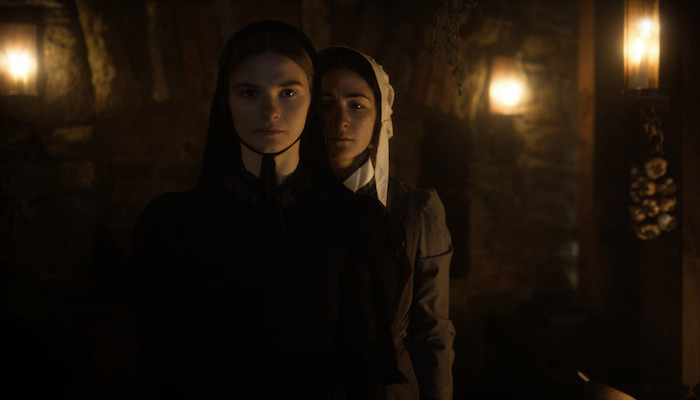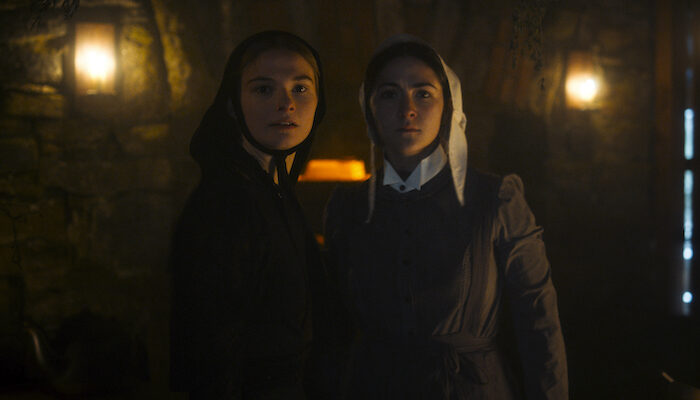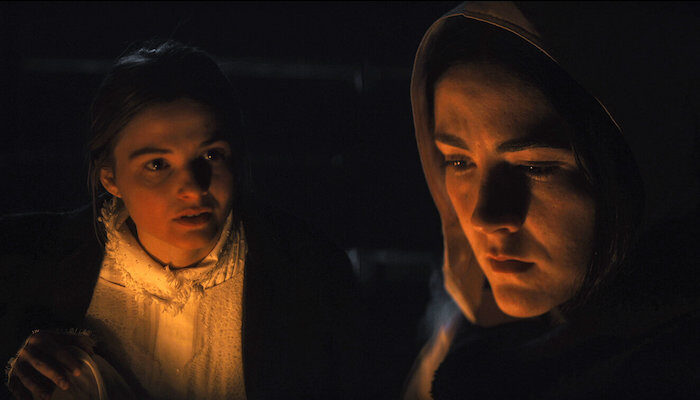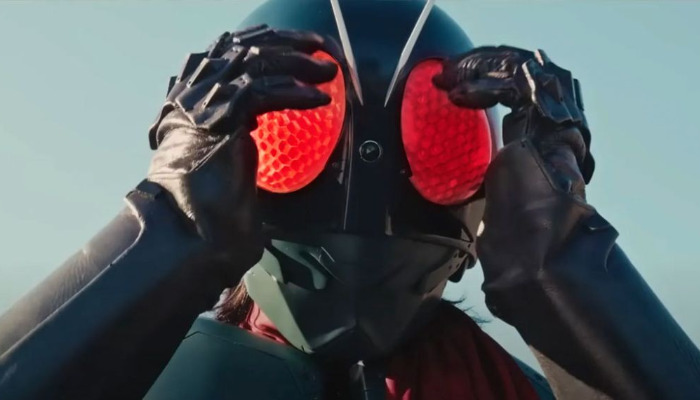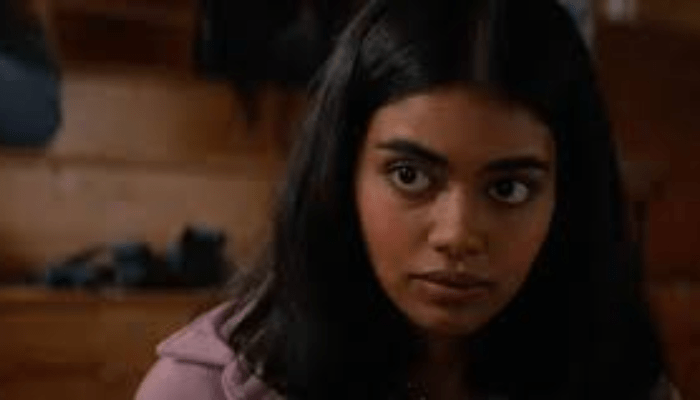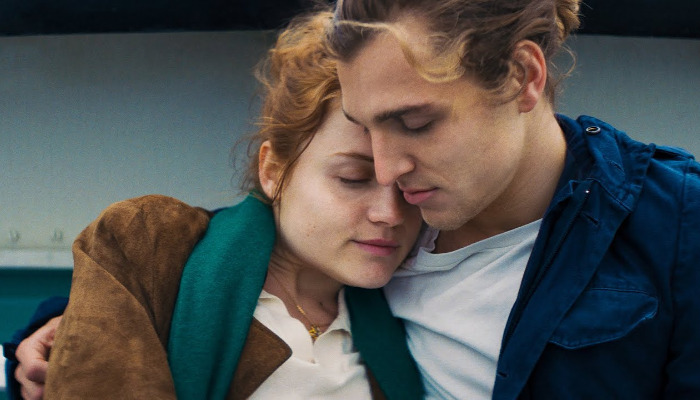Film Review: THE LAST THING MARY SAW: A Dark Period Horror-Drama That Impresses Despite Some Rough Messaging [Fantasia 2021]
The Last Thing Mary Saw Review
The Last Thing Mary Saw (2021) Film Review from the 25th Annual Fantasia International Film Festival, a movie written and directed by Edoardo Vitaletti, starring Isabelle Fuhrman, Rory Culkin, Stefanie Scott, Shane Coffey, Carolyn McCormick, Judith Roberts, Michael Laurence, Dawn McGee, Daniel Pearce, Philip Hoffman, P.J. Sosko, Matthew Stannah, Sebastian Beacon, Tommy Buck, Elijah Rayman, and Stephen Lee Anderson.
It’s convenient that Fantasia programmed a robust doc about folk horror and witchcraft as it’s proving to be a good primer for the rest of their line-up. Case in point: The Last Thing Mary Saw, Edoardo Vitaletti’s feature-length debut about religious radicalism pushing people to their wit’s end. And yet, Vitaletti’s strength is his restraint with the fantastical, using it sparingly to achieve a potent sense of surprise.
In fact, with two or three small moments that serve as major exceptions, the concepts of witchcraft and magic in The Last Thing Mary Saw are all but non-sequiturs. Vitaletti’s film is more akin to Robert Eggers’ The Witch in its shared critique of religious authority being used to perpetrate abuse, though without quite as much of the latter’s moral ambivalence.
The titular Mary (Stefanie Scott), who we first see bound up and with her eyes gouged out, recounts these abuses to her police interrogator (Daniel Pearce) as she awaits sentencing following a tragic event. Through flashbacks, Mary tells of her family’s isolated existence on the tip of Long Island in the 1840s, and how strict Christian piety was upheld through mutual surveillance and disclosure. It’s how she and her lover, the family’s servant Eleanor (Isabelle Fuhrman), were caught and forced to undergo “corrections” to appease the family matriarch (Judith Roberts). And yet, time after time of endless prayer sessions with knee braces atop sprinkled grains of rice, Mary recounts that her and Eleanor’s spirits were never broken.
Eventually they conjure up a plan to escape with help from the family’s guardsman (P.J. Sosko), a man who holds similar vengeance against the matriarch for her ruthless leadership. Mary and Eleanor’s plan goes off without a hitch – or as small a hitch as possible, considering every other member of the house will rat them out upon the faintest suspicion of a discrepancy. But events take a tumultuous turn when a mysterious stranger (Rory Culkin) comes to the house, throwing Mary and Eleanor’s plan out of balance and setting in motion evil forces lurking amidst the house’s walls.
Vitaletti’s riff on the Lizzie Borden tale – complete with lesbianism and gruesome violence – is nothing novel. In fact, for the first half of this sleek 90-odd-minute horror drama, it actually plays out in a droll manner. David Kruta’s dark cinematography, accentuated with only the low-lit orange flickers of firelight, is as pretty as it is irritating in its obvious method of obfuscation. We feel like we’ve seen this all before, making this a well-crafted though relatively safe retread.
However, the skillful infusion of dark magic and lore into only small points of the plot – particularly the climax – suddenly reframes everything within a most peculiar perspective. It adds a delightful ambiguity to the wider narrative that leaves you pondering its potential breadth, yet Vitaletti’s scope is still narrow enough so that the film never grows too big for its own britches. Rather than using the supernatural as a crutch, The Last Thing Mary Saw sees it as a terrifying hypothesis that can bring up as many questions as it does answers.
That’s not, however, to imply that it’s perfect in pulling off that feat. Framing the dark magic-addled reveal as it does makes us wonder what the film is ultimately saying about both religious abuse and queerness as an identity. Are we supposed to assume that religiosity is but a sham that people manipulate to serve their own ends, and the tragedy is how those in power eventually get others to (unsuspectingly) bend to their will? Or is the tragedy that said adherents know it’s a sham outright, yet they will still willingly submit to the jig?
In line with his previously established sense of ambiguity Vitaletti doesn’t give us a straight answer to that question. Unfortunately, by doing so he also throws the film’s alignment of Mary’s queerness into question: does she truly consider herself evil and recants her sexuality, or does she learn that the only way to live as your true queer self is to become evil? The latter supposition would be nothing new, as the queer-coded villain has long been a trope both in- and outside of the horror genre, but the lack of thematic committal to that read or the former throws the entirety of the text into discomforting territory wherein the film’s actual morals get a bit confused. It’s having your satirical cake and eating it, too, but without enough sustenance for either to be satisfying – even for the most tolerant of indulging connoisseurs. In that regard, the film’s ambiguity may ultimately be its crux, as well.
Regardless, there’s still plenty to enjoy in here to make it an intriguing genre romp. It’s still great to see Fuhrman on-screen, who between this and her award-winning turn in The Novice is having quite the festival run this year. Roberts is a personal fave and seeing her play the cold-hearted grandma with relentless cruelty was a sick bit of fun. The MVP, though, is Culkin, who makes the most of his relatively limited screen time to be downright unnerving and truly terrifying.
The Last Thing Mary Saw is a competent debut from a promising director that, despite its bumpy messaging, is a dastardly dark dysfunctional drama. You won’t need an exorcism to cleanse yourself of it, but it’ll still get under your skin.
Rating: 6/10
Leave your thoughts on this The Last Thing Mary Saw review and the film below in the comments section. Readers seeking to support this type of content can visit our Patreon Page and become one of FilmBook’s patrons. Readers seeking more Fantasia International Film Festival news can visit our Fantasia International Film Festival Page, our Film Festival Page, and our Film Festival Facebook Page. Readers seeking more film reviews can visit our Movie Review Page, our Movie Review Twitter Page, and our Movie Review Facebook Page. Want up-to-the-minute notifications? FilmBook staff members publish articles by Email, Twitter, Facebook, Instagram, Tumblr, Pinterest, Reddit, and Flipboard.
Related Articles
FilmBook's Newsletter
Subscribe to FilmBook’s Daily Newsletter for the latest news!







